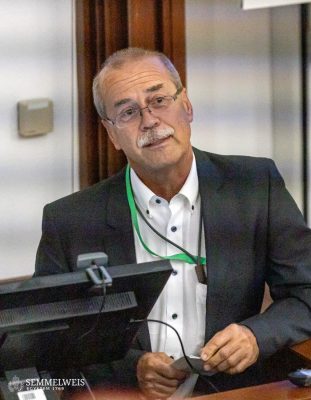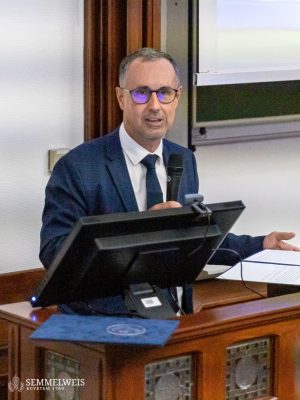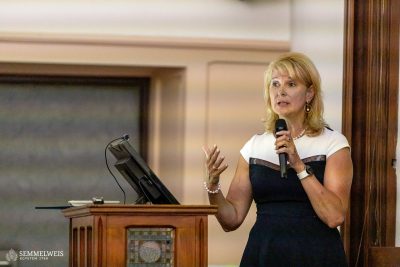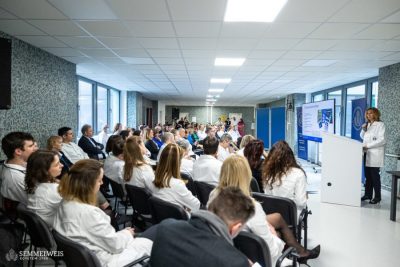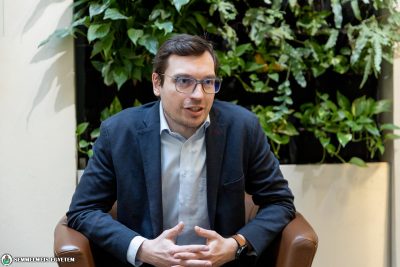“For a decade now, the Institute of Genomic Medicine and Rare Disorders has been the cradle of science at the highest level, an important workshop for translational research and personalized medicine”, Dr. Béla Merkely said in his welcome speech. The rector stressed that genetics is one of the fastest growing and most important fields of research, which is fundamentally changing the way we look at medicine.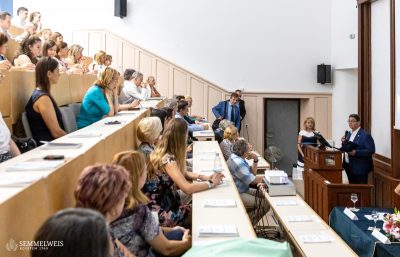
“We can be proud that our university was the first in the country to recognize that rare diseases need to be addressed in a comprehensive care setting and that a network is necessary for their multidisciplinary care,” he emphasized, adding that since 2015 the institute has been a national centre of expertise in rare diseases, a National Node of the European Reference Networks for two years and a founding member of the largest biobank network in Europe. He stressed that by teaching clinical genetics, a subject initiated by the institute, they are providing up-to-date, timeless knowledge to future generation of doctors.
“International collaborations, multidisciplinary teams, interdisciplinary synergies, personalized medicine, the use of artificial intelligence, bioinformatics developments, data-driven medicine – these are all forward-looking solutions that are present at the institute and that will bring Semmelweis University closer to its goal of becoming one of the top 100 higher education institutions in the world and one of the top 5 medical universities in Europe,” the rector emphasized.
Dr. András Matolcsy, Deputy Dean for Strategy and Development of the Faculty of Medicine spoke about the breakthrough scientific achievements of the institute in 2012, the year of its foundation.
They discovered the important role of non-coding sequences in expression, control and regulation. It was also the year when the genome of breast cancer patients was fully mapped and it was determined that they could be divided into four groups, which is very important from a diagnostic and therapeutic point of view. This year also saw the discovery that the entire genome of a 12-week-old embryo can be determined, and that the entire genome of a newborn baby can be determined in 50 hours instead of months of genetic sequencing, allowing targeted treatment of certain diseases,” he concluded.
Clinical genetics is an innovative and dynamically developing discipline of medicine and an indisputable pillar of present and future medicine,” he added. Dr. András Matolcsy recalled that the institute was the first in Hungary to carry out the first new generation of sequencing, to start genetic and clinical counseling, to coordinate the university biobank and to establish a life guidance system to support those dealing with rare disorders and those affected by them. In recognition of all this, the Hungarian Academy of Sciences has declared the institute an excellent research centre,” he pointed out.
In his speech, Dr. Attila Szabó, Vice-Rector for clinical affairs highlighted that the staff of the institute has given not only professional help but also hope to hundreds of people over the past ten years, by providing a faster diagnosis than ever before in cases that were previously considered hopeless, and by helping patients integrate into everyday life with new, personalized treatment. “They work in a field where knowledge, combined with patience and love, brings results; changing patients not only physically but also mentally and spiritually. They receive not only therapy to fight their illness in a personalized way, but they are also given a life-long perspective,” he underlined. He recalled that Count Imre Festetics was the first person in the world to use the term “genetic laws”, recognizing that the genetic laws of nature are different from all other natural laws, are intrinsically determined, can be experimentally studied and apply to humans, animals and plants alike.
In its first ten years of existence, the Institute of Genomic Medicine and Rare Disorders has proved daily that it is a worthy custodian of Festetics’ intellectual heritage, and that the institute’s teaching, research and community life embodies the great forefather’s spirit of discovery in every aspect,”
– he added.
In her lecture “Ten years in the service of personalized medicine and rare disorders”, Dr. Mária Judit Molnár, Director of the Institute, recalled the start in 2012, when the decision of the Senate of Semmelweis University allowed the institute to be separated from the Department of Neurology and to be established as an independent institute of the Faculty of Medicine. He pointed out that their clinical activities actually started in 2004, when they became the first Molecular Neurology Unit in the country to provide comprehensive care for patients with rare diseases at the National Institute of Psychiatry and Neurology (OPNI). The director pointed out that since becoming an independent institute, their outpatient turnover has been steadily increasing and their range of genetic diagnostics has been expanding. He explained that 80 percent of rare disorders are genetically determined, and 60-70 per cent of them have central or peripheral neurological symptoms, which is why an inpatient ward was needed in addition to outpatient care, and was completed in 2017.
This makes us the first national center to provide the full spectrum of healthcare for rare inherited conditions,”
– she said. She recalled that they were also affected by the pandemic, and in May 2021 the department was transformed into a COVID care center for a month. She presented the laboratories and specialized outpatient clinics at the institute, pointing out that over the last ten years they have won almost one billion HUFs in grants, in the form of 21 different research proposals. He briefly described the research currently being carried out at the institute and spoke about future plans and development directions, highlighting the importance of prevention and the desire to become an important part of data-driven healthcare in the field of rare diseases.
The 10th anniversary of the institute’s foundation was commemorated by a professional lecture. Dr. Attila Patócs presented the present and future of oncogenomics, while Dr. Gábor Pogány gave a lecture on the situation of people living with rare disorders in Hungary and internationally. Dr. Péter Balicza spoke about the clinical implementation of genomic research from the perspective of young clinician researchers, Dr. András Falus gave a video presentation on the biobanking to patient care, and Dr. György Pfliegler presented the integration of Hungarian rare disorders care into the European Reference Networks.
Bernadett Bódi, translation by Rita Kónya
Photo: Attila Kovács – Semmelweis University
